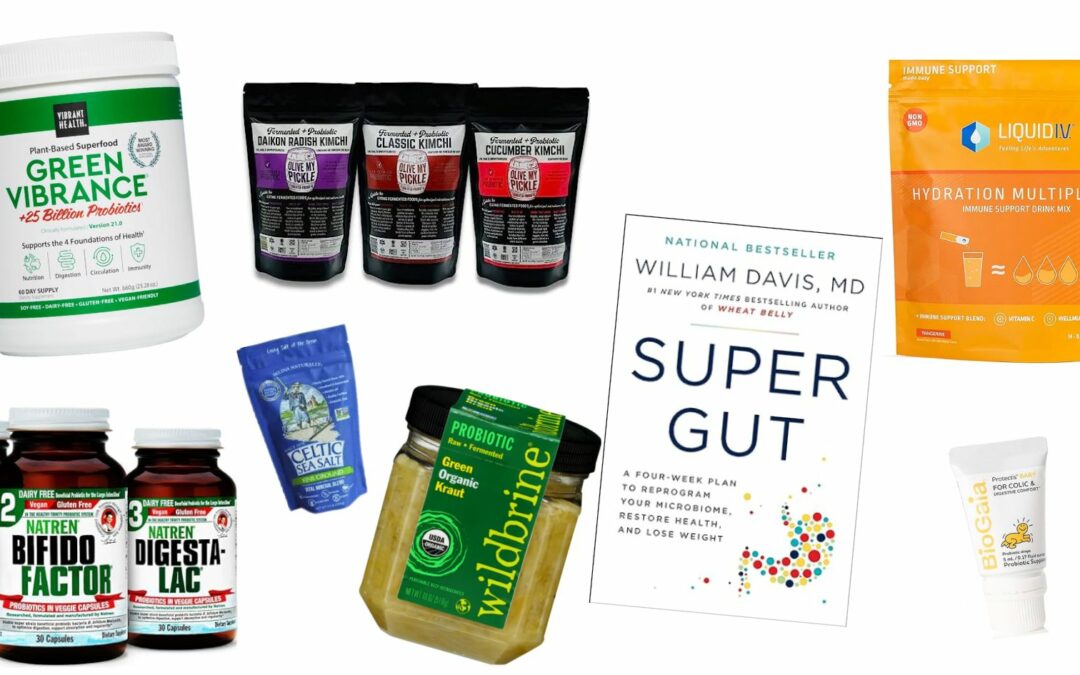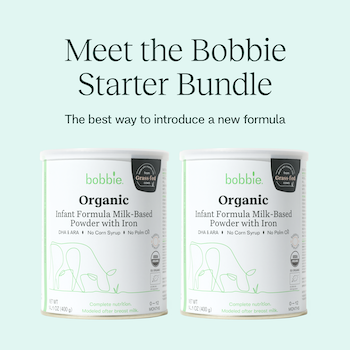Where are my IBS girlies at? I’ve had less than optimal digestion since I can remember and there have been a few specific times where I’ve made lifestyle and nutritional changes to try to heal my gut. When I got pregnant, I knew I needed to get my microbiome as healthy as possible so I would be sharing all that goodness with my son’s future microbiome.
Putting my son at a disadvantage from birth, studies show that babies born via cesarean are less likely to have as much healthy gut bacteria AND they are more likely to develop asthma (The Effects of Delivery Mode on the Gut Microbiota and Health: State of Art). When I knew I would likely need to deliver via c-section due to my son being breech, I looked into the effects of vaginal seeding — a process where the doctor swabs the baby with the mother’s vaginal fluids directly after birth. While I didn’t find that this could cause any harm, I also didn’t find strong enough data to warrant adding another task into the operating room.
So what can you do during pregnancy and postpartum to boost your and your baby’s gut health? I’ve tried a lot of things and included what actually helped below. As a reminder, this page includes affiliate links. I may receive compensation if you make purchases from this page but I will never recommend products that I don’t absolutely love.
The Gut Microbiota: Why it’s Important During Pregnancy and Postpartum
- Immune Support:
- During pregnancy, the immune system undergoes changes to accommodate a growing fetus. A healthy gut plays a pivotal role in supporting this delicate balance, contributing to a robust immune response.
- A well-balanced gut helps prevent infections and ensures that the mother’s immune system functions optimally, safeguarding both her and developing baby.
- Nutrient Absorption:
- Efficient nutrient absorption is crucial for the well-being of both mother and child. The gut microbiota aids in breaking down and absorbing essential nutrients from the diet.
- Ensuring a diverse and thriving microbial community in the gut enhances the absorption of key nutrients, such as vitamins and minerals, promoting optimal fetal development.
Gut Health During Pregnancy: A Proactive Approach
- Dietary Considerations:
- Emphasize a diet rich in fiber, fruits, vegetables, and whole grains to nourish the beneficial bacteria in the gut. A great place to start your gut health education is with the book, Super Gut.
- Incorporate probiotic-rich foods like yogurt, kefir, and fermented vegetables to introduce beneficial bacteria, promoting a healthy microbial balance. Here are some of my favorite probiotic rich foods that I ate during pregnancy and beyond,
- Wildbrine’s organic raw sauer kraut (I’ve linked the Amazon version for convenience but Costco has a great deal on the same product)
- Anything by Cleveland Kraut but especially their spicy “Gnar Gnar” flavor
- Any flavor by Olive My Pickle. I’m especially obsessed with their spicy green beans
- Hydration:
- Drinking an adequate amount of water is crucial for maintaining gut health. Proper hydration supports digestion, helps prevent constipation, and ensures the smooth functioning of the digestive system. Here’s some things I’ve added to my water to increase hydration/mineral absorption,
- Celtic Sea Salt. I’ll admit, adding salt to my water wasn’t on my pregnancy bingo card but a naturopath recommended it and I personally found it helpful. When I tried to find a study to link for this, I found conflicting evidence as to whether the added trace minerals in Celtic salt as opposed to other forms of salt is significant. For that reason, I will leave it as my anecdotal opinion and let you decide for yourself.
- Liquid I.V. Hydration Multiplier. My husband and I both drink this in lieu of sports drinks and we both prefer the tangerine flavor over anything else. I also use this to stay hydrated while breastfeeding and it’s super helpful (you can usually get a good deal at Costco).
- Drinking an adequate amount of water is crucial for maintaining gut health. Proper hydration supports digestion, helps prevent constipation, and ensures the smooth functioning of the digestive system. Here’s some things I’ve added to my water to increase hydration/mineral absorption,
Postpartum Recovery: You Can’t Take Care of Baby if You Aren’t Taking Care of Yourself
- Breastfeeding and Gut Health:
- Whenever I talk about breastfeeding, I like to first shout from the mountain tops: FED IS BEST! I never ever want a mom to feel guilty about how their baby eats and I am the first to admit that I keep formula stocked in the house for whenever I need to supplement my supply. That being said, if breast feeding is in your journey — breast milk is a natural source of prebiotics, which support the growth of beneficial bacteria in the baby’s gut.
- If breast feeding is not part of your journey, or if you simply want to double up on probiotics, ask your pediatrician about giving your little one baby probiotics (we’ve used BioGaia). There are also baby formulas that include probiotics but I have not personally tried any.
- Whenever I talk about breastfeeding, I like to first shout from the mountain tops: FED IS BEST! I never ever want a mom to feel guilty about how their baby eats and I am the first to admit that I keep formula stocked in the house for whenever I need to supplement my supply. That being said, if breast feeding is in your journey — breast milk is a natural source of prebiotics, which support the growth of beneficial bacteria in the baby’s gut.
- Probiotic Supplementation:
- Consider probiotic supplementation, especially after childbirth or if there have been interventions like antibiotics during labor.
- You’ve probably been inundated with ads on social media for popular “green powder” drinks that include vitamins and promote gut health. I’m going to recommend one that you likely have never heard of: Green Vibrance. This stuff has been around way before green drinks were popular and it includes 25 billion probiotics. Everyone I have gotten to try this has noticed a difference almost immediately. My husband and I drink it with a small amount of juice and the taste doesn’t bother me at all.
- Similarly to green drinks, I’m sure your social feeds have pushed various probiotic supplements. I’ve tried several of the popular ones (I won’t name names) and nothing seemed to pack a punch until my mom found a brand called Natren. Founded by a woman, this brand literally coined the term “probiotic.” I get their three step system and I will be continuing to be a loyal customer.
- Consider probiotic supplementation, especially after childbirth or if there have been interventions like antibiotics during labor.
Citations:
- Liu Y, Li HT, Zhou SJ, Zhou HH, Xiong Y, Yang J, Zhou YB, Chen DJ, Liu JM. Effects of vaginal seeding on gut microbiota, body mass index, and allergy risks in infants born through cesarean delivery: a randomized clinical trial. Am J Obstet Gynecol MFM. 2023 Jan;5(1):100793. doi: 10.1016/j.ajogmf.2022.100793. Epub 2022 Nov 2. PMID: 36334724.
- Zhang C, Li L, Jin B, Xu X, Zuo X, Li Y, Li Z. The Effects of Delivery Mode on the Gut Microbiota and Health: State of Art. Front Microbiol. 2021 Dec 23;12:724449. doi: 10.3389/fmicb.2021.724449. PMID: 35002992; PMCID: PMC8733716.



